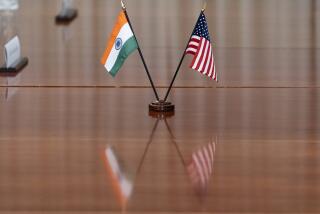India says execution not end to justice efforts in Mumbai attack
- Share via
NEW DELHI — India’s execution Wednesday of the only surviving gunman in the 2008 attack on Mumbai that killed 166 people won’t deter its ongoing effort to bring the planners to justice.
Officials in New Delhi want Pakistan to hand over senior insurgents from the notorious Lashkar-e-Taiba group, which they believe planned the attack and guided the terrorists by telephone throughout the 2 1/2-day assault. Pakistan has argued that there’s insufficient evidence to prosecute militants from the group, which reportedly enjoys close links with Inter-Services Intelligence, Pakistan’s main spy agency.
The execution of Ajmal Amir Kasab, 25, in Pune’s Yerwada jail was carried out in secret to prevent protesters from delaying it and came after President Pranab Mukherjee turned down his appeal for clemency. Kasab’s body was reportedly buried within the grounds of the prison.
Kasab was convicted in May 2010 on 86 charges of terrorism, murder, weapons possession and “waging war against India.” His execution ended an unofficial moratorium on the death penalty that’s been in place since the Congress Party came to power in 2004.
Santosh Singh, 42, a security guard whose wife and 5-year-old son were injured in the attack at Mumbai’s Chhatrapati Shivaji rail terminal where Kasab was apprehended, praised the execution.
“I am happy he was punished, but don’t understand why it took four years and so much public money,” he said. “And I don’t know why he was hanged in so much secrecy.”
Kasab was awakened about 5 a.m., drank a cup of tea, remained calm and smiled as he was taken to the gallows where he was hanged at 7:30 a.m., Indian media reported, quoting jail officials. Even the executioner reportedly didn’t know his identity until an hour before the hanging occurred.
In November 2008, Kasab, a 21-year old from Pakistan’s poor southern Punjab state was among 10 gunmen who launched well-coordinated strikes on the railway station, hotels, a restaurant and a Jewish center in India’s financial capital.
Indians expressed satisfaction on hearing the news.
“Better late than never,” said Mukhtar Abbas Naqvi, a leader with the main opposition Bharatiya Janata Party. “The enemy of the country has been punished.”
Not everyone agreed, however. Kamini Jaiswal, a lawyer opposed to the death penalty, said she thought life in prison would be a more fitting punishment. “They are trained that death will take them to heaven,” she said. “Today he has achieved what he wanted. He has reached his heaven.”
Special correspondent Sharma reported from New Delhi and Times staff writer Magnier from Tel Aviv.
More to Read
Sign up for Essential California
The most important California stories and recommendations in your inbox every morning.
You may occasionally receive promotional content from the Los Angeles Times.













